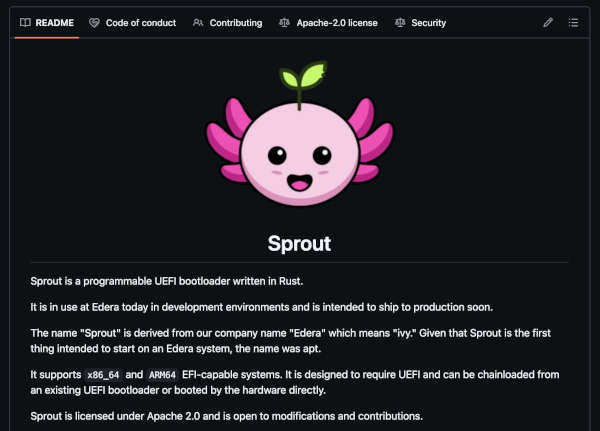| Edera Open Sources Sprout |
| Written by Kay Ewbank | |||
| Thursday, 13 November 2025 | |||
|
Edera has announced an open source version of Sprout, a bootloader built in Rust. The security specialists also announced success in penetration testing and integration with Falco. The announcements were made at KubeCon Atlanta. Edera is known for security solutions including Protect Kubernetes, a Kubernetes and AI security solution; and Am I Isolated, which provides a security benchmark that tests for container isolation.
The company has now open-sourced Sprout, which is described as a Rust-powered bootloader for the cloud-native era. Sprout is designed to offer faster boot times than existing bootloaders such as GRUB. Edera says Sprout delivers unparalleled security, sub-second boot speed, and simple, data-centric management for any operating system.
Bootloaders are a prime target for deep system compromise, but Edera has developed Sprout in Rust, so eliminating various types of memory safety bugs such as buffer overflows. The product has been designed to be focused and thin to reduce the attack surface. Edera says that by limiting functionality to only what is necessary for a modern, standards-compliant boot, the opportunity for malicious exploitation has been minimized. In addition, when deployed alongside modern UEFI systems, like Patina, Sprout helps create a fully memory-safe path to the Linux kernel. This ensures integrity from the moment the system firmware hands off control, a critical defense against bootkits. Sprout's configuration and management features have also been designed to eliminate risks. Whereas traditional bootloaders use shell scripts and configuration generators, Sprout uses a manifest-like configuration that is human- and machine-readable and writable, so platform engineers can manage boot entries using standard automation tools. It uses the community-driven standards based systemd Bootloader Specification (BLS) to simplify enterprise deployments. There's also an autoconfiguration feature that automatically detects and integrates existing system configurations, making the migration from GRUB a simple and seamless process. Edera says that by being faster, smaller, and written in Rust, Sprout achieves very fast fast boot times, often starting Linux in under 50 milliseconds, so supporting autoscaling and rapid deployment in dynamic cloud infrastructure. It also has the ability to intelligently configure the Edera hypervisor dynamically at boot time. This moves hypervisor setup away from complex, static pre-configuration, simplifying system deployment for enterprises with complex virtualized or bare-metal setups. Alongside the new bootloader, Edera also announced success in a penetration test. The company engaged Trail of Bits, a security research firm specializing in software testing and code review, to conduct an independent security assessment of Edera to get an independent check. Trail of Bits carried out a four-week security assessment of Edera's infrastructure, and found no high or medium severity vulnerabilities in their evaluation. The assessment included manual code review, static analysis, and dynamic testing with full access to source code and documentation. The complete assessment report, including detailed findings and recommendations, is available upon request. The review examined isolation boundaries, hypervisor security, GPU passthrough safety, memory initialization, default security posture, and defense in depth, and arrived at the verdict that Edera's systems are generally robust. In their executive summary, Trail of Bits concluded: "The security posture of Edera and its surrounding infrastructure is generally robust, with no medium or high severity findings identified in this audit." Critically, they noted that "we did not identify any vulnerabilities that would compromise the primary isolation guarantees of the system (chiefly, that zones are isolated from one another and from the host)." The audit did identify 15 findings – 10 low severity and 5 informational – primarily related to input validation and defense-in-depth measures, all of which Edera are addressing. Edera says the findings reinforce confidence in Edera's core security model, because even after intensive scrutiny, the fundamental isolation guarantees remain intact. "Our extensive use of Rust for critical components, which provides memory safety guarantees that eliminate entire vulnerability classes common in traditional C-based hypervisors, was noted as a positive by Trail of Bits."
MicroVMs are lightweight virtual machines that combine the isolation of traditional VMs with the speed and efficiency of containers. By running each workload in its own lightweight virtual machine with a dedicated kernel, technologies like Edera provide hardware-level isolation that dramatically reduces the attack surface compared to traditional containers. However, the enhanced security means traditional monitoring tools can't see what's happening inside microVMs. Falco uses custom rules on Linux kernel events using kernel probes (kprobes) or eBPF, depending on configuration to provide runtime security across hosts, containers, and Kubernetes environments. When workloads run in isolated microVMs rather than sharing the host kernel, security teams lose the visibility they depend on for threat detection and compliance. Edera's integration with Falco provides a native Falco plugin that seamlessly exchanges syscall events from Edera zones (the company's microVMs) to an existing Falco deployment. The integration uses Falco's plugin API and wraps Falco's libscap library to ensure complete syscall coverage. This means organizations can reuse existing rules, get a consistent event format, intelligent filtering, and deployment: via standard Falco plugin management tooling. Edera deploys Falco's eBPF instrumentation inside each zone, stream events to the host through Edera's secure inter-domain communication channel, and delivers them to the Falco agent through Edera's plugin. This provides a unified security view across all workloads, whether they're running as traditional containers or in hardened microVMs. This means security teams, can adopt stronger workload isolation without sacrificing runtime detection capabilities. Sprout is available now on GitHub.
More InformationRelated ArticlesEdera Announces Hardened Runtime Security Falco On Track To Version 1.0.0 Edera Protect Expands Security Model Edera Releases Protect AI And Announces New Funding Edera Releases Open Source Container Benchmark And Scanner To be informed about new articles on I Programmer, sign up for our weekly newsletter, subscribe to the RSS feed and follow us on Facebook or Linkedin.
Comments
or email your comment to: comments@i-programmer.info |
|||
| Last Updated ( Thursday, 13 November 2025 ) |



